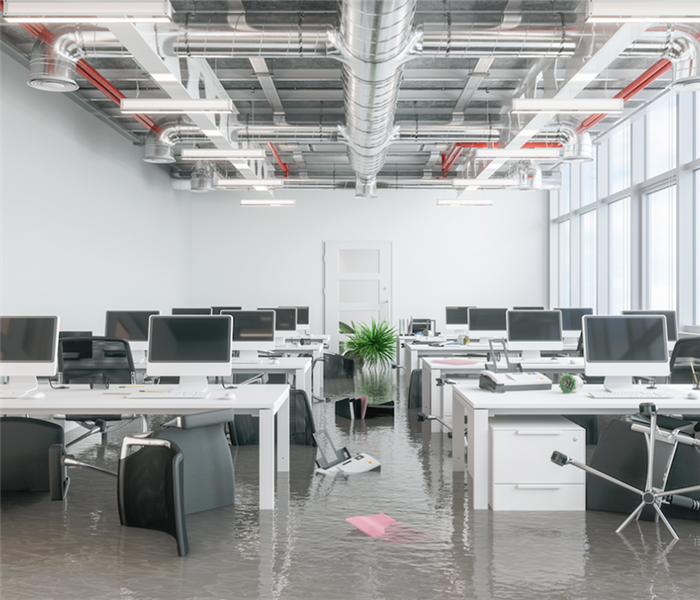Fast Cleanup of a Business’s Water Damage Strengthens North Syracuse.
2/21/2021 (Permalink)
 Water damage at your business can certainly interrupt the flow. Contact SERVPRO for remediation services and certified technicians.
Water damage at your business can certainly interrupt the flow. Contact SERVPRO for remediation services and certified technicians.
Our Village Had Previous Names, Before it was Called North Syracuse.
Our village was not always called North Syracuse. In the early 1800s, many places in New York remained undeveloped and untouched by anyone but the indigenous tribes. When settlers moved into an area, homesteads and family farms held the only non-indigenous individuals for miles. As more people moved into an area, small settlements took root.
One of these settlements was called Podunk, which, to many people, means a small place where the pace of life remains slow and relaxed. Podunk grew in size as more families settled in the area. With new roads built to support the salt industry, Podunk's people renamed it Centerville in 1869. Eleven years later, in 1880, another name change occurred, resulting in what we have now, North Syracuse. Almost half a century later, formal incorporation of our village took place.
Different things helped us steadily grow, including
- The salt industry that passed through, and
- The first (wooden) plank road in America that kept transportation possible even in muddy conditions.
The plank road in our area did not fare as well as many others did. The road needed constant repairs, and while materials remained available nearby, the costs of the necessary maintenance created an ongoing financial burden. This happened even with the four tollhouses' creation spaced evenly along the 16.5 miles length of the plank road. Several investors lost their life savings because of the never-ending cost involved in making crucial repairs.
The weather and the soil composition made regular dirt roads unusable most of the time. Rain and snow could wash a road out or leave heavier vehicles stuck for days. The same weather caused planks to deteriorate rapidly and unable to last the expected decade. Many fell apart after less than half that time. The boggy, spongy soil made gravel unstable. A better road that could endure the weight in terrible conditions and maintain its stability comes from engineering with rock, sand, and intense labor.
Eventually, sections of the road were pulled up, and gravel was used instead. Paving also became more common, and the original road ended up completely paved by 1917. It is now a part of the highway, specifically US 11. More durable materials could last through heavy rains, freezing winter weather, non-stop traffic and its heavy loads to make North Syracuse vibrant.
Water damage cleanup in North Syracuse – Messy but necessary.
Restoring your commercial building to safe conditions included eliminating any hazards, both visible and microscopic. Clean water can allow anything that existed within a normal range population-wise to increase in number and migrate to other areas.
SERVPRO wants to stop both explosive growth and the ability of such possible pathogens to relocate within your building. Doing this can become quite messy, but SERVPRO’s dedicated and highly trained crew arrive with all the gear, materials, tools, and equipment to regain control of an otherwise hopeless-looking situation.
The overall durability, including inherent porosity, of any material exposed to water dictates how much damage it sustains. Concrete and stone contain pores, and both materials can suffer damage from water. The roads in Rome were often paved with a combination of the two, and many show the signs of wear and tear from rain and floods. Clean water from a break in your water lines can leave water over a concrete slab or seeping into a basement’s concrete floor. Freezing temps can make the tiniest cracks noticeable.
Cleanup covers the following for your North Syracuse business:
- Extraction of visible water – pumps of various sizes leading to our pump truck and never to your drains,
- Removal of damaged materials (furniture, flooring, walls) – by hand using buckets, bags, and shovels,
- Disinfectant sprays on all surfaces – both before we start and just before we finish,
- Rinsing and wiping down of hard surfaces – removes any debris or grittiness and leaves surfaces nearly dry,
- Desiccant machines – removing water vapor lets air do more work in getting everything dry,
- Carpet cleaning wherever possible – reduces costs and controls odors, and
- Structural repairs, including plumbing and electrical.
SERVPRO of North Onondaga County is always prepared and ready to help with B2B services, including water damage cleanup, mitigation, and repairs. Contact us by calling (315) 457-3432, 24/7, any day of the year.






 24/7 Emergency Service
24/7 Emergency Service